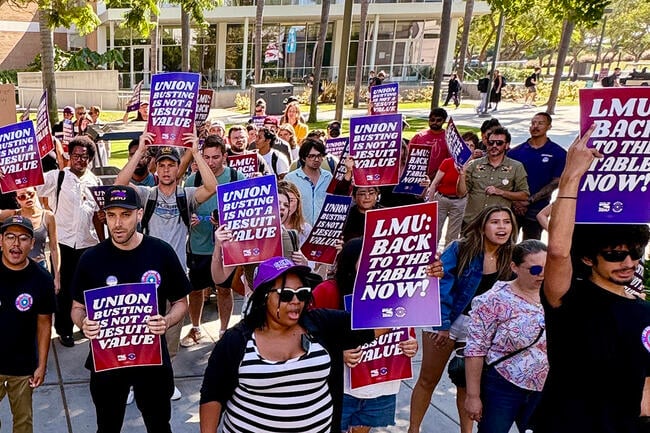You have /5 articles left.
Sign up for a free account or log in.

Loyola Marymount union members, students and other supporters rallied Tuesday before a town hall–style meeting about the university’s decision.
Emily Dorrel/SEIU 721
The Loyola Marymount University Board of Trustees will no longer recognize its new non-tenure-track faculty union and cease bargaining, claiming a religious exemption with the National Labor Relations Board, the Roman Catholic institution said last week.
If the university succeeds in shuttering its union post hoc, it could set a precedent that would put faculty unions at other religious colleges at risk, experts say. For now, the move has left faculty bewildered, angry and wondering what’s next.
The announcement was a shock, said Bryan Wisch, a rhetorical arts instructor at Loyola Marymount and member of the bargaining team. A decade after the university snuffed out initial unionization efforts, non-tenure-track and visiting faculty in three of the university’s colleges successfully voted to unionize in June 2024. Contract negotiations began in December, and union and university representatives have met 12 times to bargain since then. During that time, university officials never mentioned that they intended to claim the exemption, Wisch said.
“This is completely illegal and it’s also immoral,” Wisch said, adding that the union has already filed an unfair labor practice charge with the NLRB. “Our Board of Trustees and our administration [have] abandoned the school’s values to betray the faculty, and it’s very clear that they’re just doing this because they don’t respect their faculty and they don’t want to have to bargain with us.”
In a letter posted online, board chair Paul Viviano defended the decision, saying that invoking the exemption “preserves the institutional autonomy necessary” to fulfill the university’s mission.
“During the last 10 months of bargaining, the [union] presented 39 proposals that the university considered and evaluated with care. The costs of those proposals—or a likely negotiated settlement—likely would have required unprecedented tuition increases of 18 percent, significant layoffs, and sweeping reductions in programs and services,” Viviano wrote. “Such outcomes are not in the best interests of LMU students or their families, and would jeopardize the university’s near-term viability and long-term sustainability. Therefore, invoking the religious exemption is necessary because the impact of the union’s proposals would place LMU’s distinctive culture, values, and financial health at genuine risk.”
The union and the university had not reached a tentative agreement on any proposals—economic or otherwise—over the past 10 months, Wisch said. As is typical with opening proposals, the economic proposals the union presented were “aspirational,” he explained. “We want to emphasize that non-tenure-track faculty have been exploited by universities and that we deserve decent middle-class jobs and so … we’ve made some very aggressive first proposals expecting that we were going to be negotiated down.”
University officials never offered a counter to those proposals, according to Wisch.
Loyola Marymount spokesperson Griff McNerney said that officials did offer counters, but did not specify whether the university countered the economic proposals put forth by the union.
“The university also conducted rigorous financial analyses, and shared results with the union’s SEIU in July. We also modeled reduced scenarios, but every path led to the same conclusion: unsustainable costs that would force an 18% tuition increase, 300 layoffs, and cuts to student programs. That outcome directly contradicts LMU’s mission. At that point, the Board determined the responsible path was to invoke the religious exemption and engage with faculty directly,” McNerney said in an email.
On a webpage explaining the decision, university officials outlined their “commitments to faculty”: The university will implement an average 7.8 percent merit-based raise and market salary adjustment for full-time, non-tenure-track faculty members in the bargaining unit, with some faculty receiving an up to 10 percent raise, effective as of Aug. 16, 2025. Part-time and visiting faculty will also be awarded raises. University officials also outlined plans to support more multiyear contracts, increase the number of full-time positions and strengthen shared governance, but they did not publicize timelines for these plans.
It’s not unprecedented for a religious institution to invoke the exemption to NLRB jurisdiction, but the timing of Loyola Marymount’s announcement makes it unusual, said William Herbert, a public policy professor at Hunter College, part of the City University of New York, and executive director of the college’s National Center for the Study of Collective Bargaining in Higher Education and the Professions. University officials never brought up their religious objections when the union filed a petition for representation in June 2024.
Usually, Herbert explained, that’s when “the employer comes and says, ‘No, NLRB, you should decline jurisdiction because we provide a religious educational environment.’ In this case, Loyola Marymount did not object to the representation petition filed by faculty last year on that issue. In fact, it objected on other issues, but not [religion] … In many cases, when you don’t object to something, it’s considered to be waived when you then try to come back and raise it again.”
The university doesn’t need the NLRB’s approval to take the exemption; it can do so at any time, explained Catherine Fisk, a professor of labor law at the University of California, Berkeley, and former professor at Loyola Law School. Still, the decision to do so now is troubling, she said.
“I think this is the leaders at the university and their lawyers exploiting Catholicism as an excuse to exempt themselves from complying with law, and I think they’re doing it because they think the U.S. Supreme Court has at least five justices—Catholics—who will agree with them,” Fisk said.
Since the Loyola Marymount union was recognized last June, a lot has changed at the NLRB. The board is currently without a quorum after President Donald Trump fired former board chair Gwynne Wilcox, and as a result it cannot decide on cases. Trump appointed two new board members in July, but they still await confirmation in the Senate.
The board’s regional offices are running as usual, Fisk said, and the regional office for Loyola Marymount will handle the union’s unfair labor practice charge, but once it makes its way through an appeals process and up to the NLRB, “it will then sit there until the board, once again, has a quorum,” she explained.
Whether the NLRB has jurisdiction over employees at religious colleges has been debated for years. In 2015, the Obama-era NLRB ruled against Pacific Lutheran University’s claim that its non-tenure-track faculty members are managerial employees and therefore not entitled to collective bargaining—a decision that paved the way for easier unionization at religious colleges. In 2020, the Trump-appointed NLRB reversed this precedent by siding with Bethany College, a Lutheran college in Lindsborg, Kan., and saying the board does not have jurisdiction over religious campuses. Two years later, Edward Waters University, a Christian and historically Black university in Jacksonville, Fla., withdrew recognition of its American Association of University Professors chapter as “assertion of the University’s rights as a religious educational institution.”
Maureen Gonzales, a lecturer in the dance department and member of the bargaining team, said she wasn’t surprised by Loyola Marymount’s decision to invoke the exemption.
“Shocked, outraged, horrified, nervous, sure,” she said. “A lot of the unit members are wondering what we are going to do without this protection of the union. For as long as they’ve been delaying and dragging their feet and union busting along the way, it’s not as surprising to have them try and do this now.”
She and other union members are uncertain exactly why leadership invoked the exemption now, but Gonzales did note that the university had a different president, Timothy Law Snyder, when the union was recognized. Since June, Thomas Poon has served as president.
The Catholic Church has a long history of support for unions and organized labor. In Pope Leo XIII’s 1891 encyclical Rerum novarum, he defended the right of workers to form unions. The late Pope Francis said in 2022 that “there is no union without workers, and there are no free workers without a union.”
“Unambiguously, the Catholic Church is pro-union, and our administration has abandoned the values of our university in making this reckless, immoral and illegal move,” Wisch said. “But they can still remedy it. We look forward to meeting them again at the bargaining table.”



